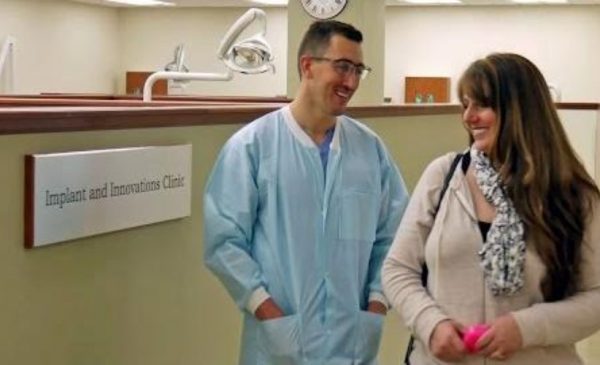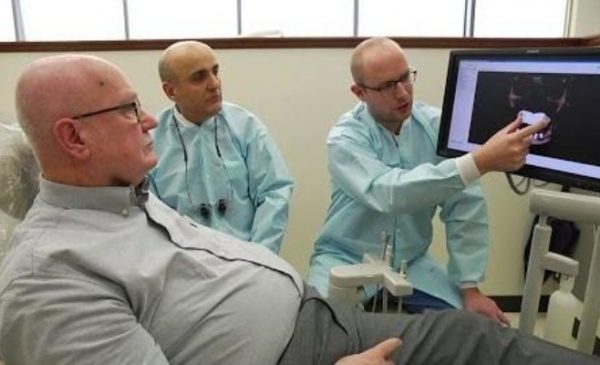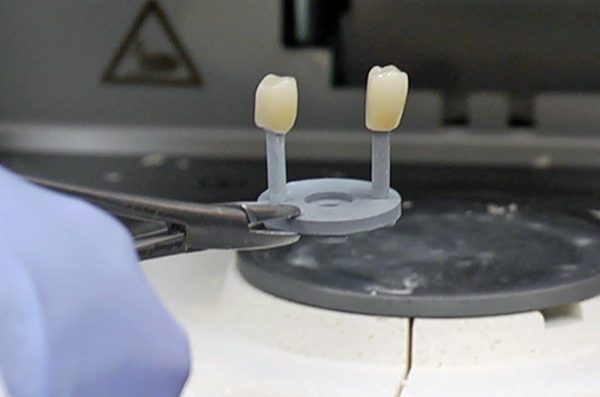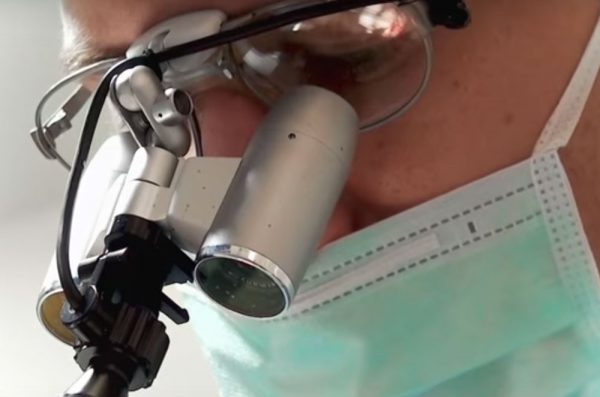Guide to Dental Implants: A Popular Option for Tooth Replacement
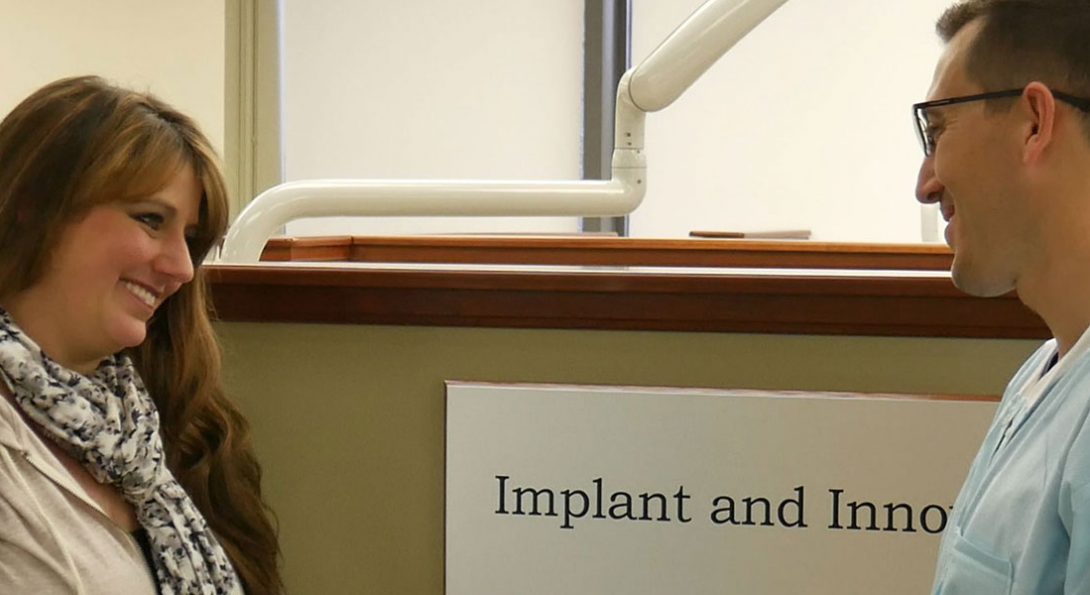
Missing teeth?
Dental implants are a popular option for many people to restore confidence to eat, speak, and enjoy life with a healthy smile.
Are you missing teeth? Heading link
Are you missing teeth, or having problems with an ill-fitting denture or bridge? If so, you should consider dental implants.
The next best thing to real teeth, dental implants are designed to look, feel, and function like your natural teeth so you can be confident in your smile. Because of their advantages over traditional tooth replacement options, dental implants provide excellent long-term value and can be a terrific investment in long-term oral health.
Dental implants offer several advantages: Heading link
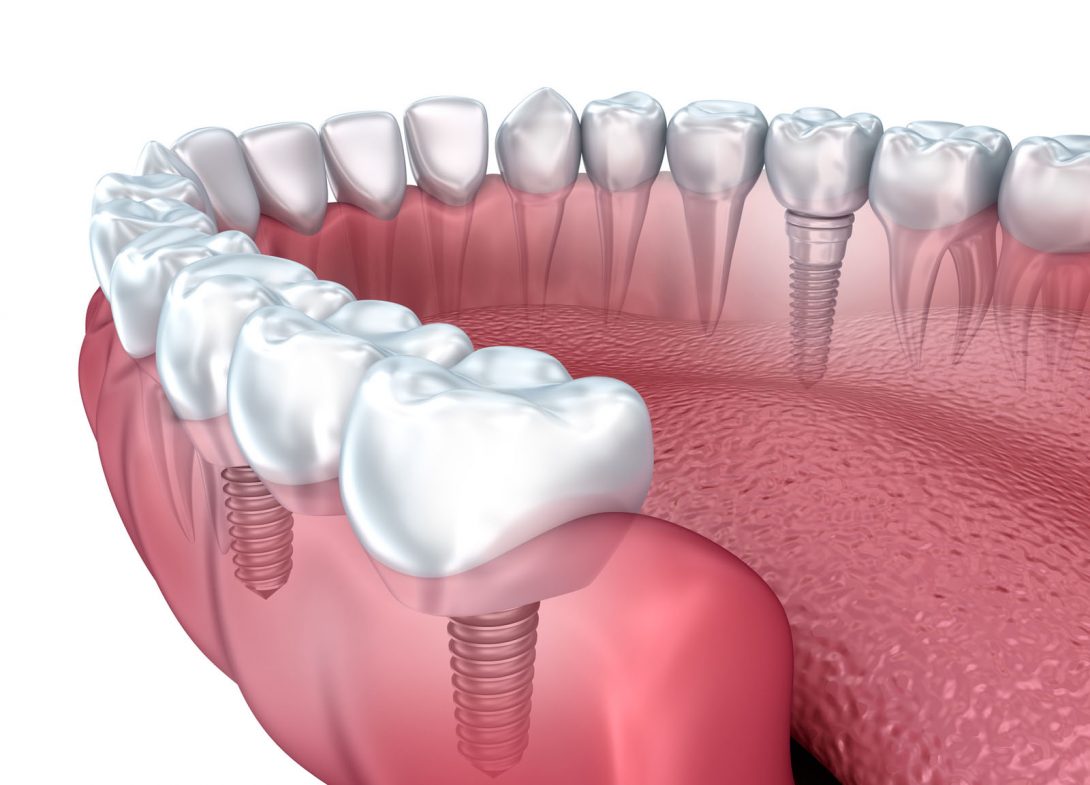
1. Natural look and comfortable fit.
Dental implants are designed to look, feel, and function like your natural teeth. In addition, implants give patients the confidence to smile, eat, and engage in social activities without worrying about how they look or if their dentures will fall out.
2. Long-lasting and reliable.
With proper care and maintenance, implants last as long as conventional restorations on teeth, with predictable outcomes.
3. High success rate.
Well planned and cared for dental implants generally offer ‘survival rates’ comparable or better than other teeth replacement options. And, as implant technology and techniques improve, so should their success rate. People in good health have the best chance for successful implants.
4. Improved ability to eat and chew.
Dental implants are anchored in your jaw bone just like natural teeth. Over time they will help preserve the jaw bone and significantly reduce bone resorption. Replacing missing teeth with implants allow you to chew your food better and speak more clearly.
5. Improved facial and bone features.
Dental implants preserve natural tooth tissue by avoiding the need to cut down adjacent teeth for conventional bridgework. They also will preserve bone and significantly reduce bone resorption and deterioration that results in loss of jawbone height. Dental implants also help restore your jawbone structure because they reduce the load on the remaining oral structures/teeth and preserve natural tooth tissue and reduce bone resorption and deterioration that results in loss of jawbone height.
Ready for a consultation? Heading link

Book a consultation online with one of our dental implant specialists to restore your smile and confidence!
Find out if dental implants are right for you, and receive an initial estimate of time and cost.
How do I know if dental implants are a good option? Heading link
Dental implants may be good option for you if:
- You have one or more missing teeth
- You have a bridge that needs to be replaced
- Your dentures are slipping, clicking or keeping you from eating what you want
- You are experiencing bite problems or pain because of a missing tooth
What is a dental implant? Heading link
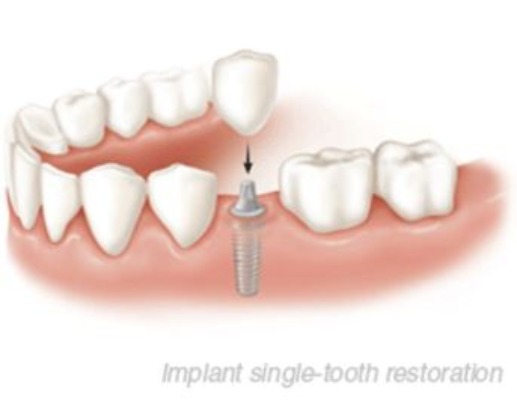
A dental implant is a prosthetic replacement for a missing tooth. Natural teeth consist of the crown and the root. The crown is the visible section that is covered with white enamel. Supporting the crown is the tooth root which extends into the jawbone. The root is the part of the tooth that is effectively replaced by an implant. There are commonly three parts to what is described as an implant – the implant device itself (which is inserted directly into the bone); the abutment – the piece that connects the implant device to the third part – the overlying crown or denture.
Implants can be used to replace a single tooth, several adjacent teeth, all missing teeth in a jaw, or to support a removable or fixed denture. The number of implants being placed will depend on the final restoration and the amount of bone available for the implant.
What is a dental implant? Continued Heading link
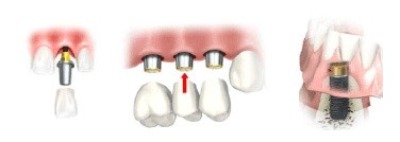
Today’s implants are predominantly made of titanium, a metal that is bio-compatible and offers strength and durability as well as a unique property of fusing directly to bone – the process known as osseointegration. Other materials, such as zirconium, might be used to make implants in the future. But for now, these materials have not been perfected for general use.
What are the benefits of dental implants versus other treatment options? Heading link
Benefits of dental implants include:
- Predictable and excellent outcomes with improved appearance, speech, chewing ability, and over oral health. More importantly, implants give patients the confidence to smile, eat, and engage in social activities without worrying about how they look or if their dentures will pop out.
- Preservation of the remaining healthy bone after extraction.
- Preservation of adjacent teeth and their enamel, as they do not need treatment to replace a missing tooth (e.g., bridge).
- Resistance to cavities as implants do not decay like natural teeth.
- Potential for a fixed restoration as opposed to a removable prosthesis.
- Assist in retention of a removable prosthesis.
What is involved in getting dental implants? Heading link
Step 1: A thorough examination
The first step involved is a thorough examination and development of a treatment plan.
Step 2: Placing the dental implant(s)
Following an examination, the placement of the implant and final restoration includes several steps:
A titanium, screw-shaped implant post is surgically placed in the jawbone and allowed to heal.
- For a single-stage procedure, the dental implant is placed and a temporary abutment is attached.
- For a two-stage procedure, the dental implant is inserted, covered by the gum tissue, and given time to heal.
As healing occurs, the implant will “osseointegrate” or fuse with the bone to form a strong, long-lasting foundation for the overlying prosthesis. This can occur within weeks to months. At times, a temporary prosthesis can be used to restore the area while the implant is healing.
Step 3. Attaching the abutment
Once the implant has integrated, an abutment that passes through the gum tissue is screwed onto the implant. The final prosthesis, which may be an individual tooth, a bridge, or a denture containing multiple teeth is then attached to the abutment.
- For a single-stage procedure, the final (or permanent) abutment is placed and an impression (or 3D scan) is taken from which a crown will be created to match your natural teeth.
- For a two-stage procedure, a secondary surgery is performed to reveal the dental implant for abutment placement.
Step 4. Fitting and re-examination
When the crown is ready, it is attached to the abutment. This is usually followed by one or more follow-up visits to ensure a good fit, look and functionality. The last step is to maintain at home care, and schedule regular dental visits (as recommended by your dentist) to maintain implant health.
How much do dental implants cost? Heading link
The costs of dental implant care can vary based on the extent of treatment required. You can replace a single tooth, multiple teeth or all of your teeth with implants. For single tooth and limited replacement situations, implant costs are similar to more conventional replacement options (e.g., bridges, partials). For multiple teeth or more complex restorations implants are generally more expensive than other tooth-replacement methods such as removable dentures or fixed bridges on teeth.
Your actual out-of-pocket cost of a dental implant treatment can range from a few hundred to several thousand $ dollars depending on a number of factors:
- How many teeth are replaced (single tooth versus most or all teeth)
- Your preference for removable versus fixed in place tooth replacements
- Prerequisite treatment required such as bone or tissue grafting
- Health of the jawbone and gums
- If you elect to use insurance coverage vs. paying yourself
To provide you a specific cost estimate, we will first complete a full evaluation and take into consideration your dental needs and current health status. This is because dental implants are customized for your mouth. A written treatment plan will then be prepared detailing the sequence of treatment, and an estimate of time and associated costs.
At UIC your dental care cost depends on which care option you are matched to based on your preference and our learning objectives. As a dental school, we offer care by students, resident specialists, and faculty instructors, each of which have different rates of service. For straightforward treatments, you could be seen by a dental student (overseen by faculty) at a significantly reduced fee as compared to private dentists. For more complex treatments, we have a team of highly qualified residents and faculty who regularly provide even the most challenging dental implant treatments.
How long will it take to get my implants? Heading link
The time for implant treatment varies on an individual basis, depending on many factors. It includes evaluation and planning, surgically placing implants, healing, and placing final restorations on the implants. The entire treatment time ranges from immediately placing implants and restorations after removal of a tooth, to several months or even a year after implant placement. More complex treatments usually take longer. It is best to consult with the dental care provider, as he/she needs to evaluate the medical history, dental history and existing condition to determine the best treatment approach.
All-On-Four Dental Implants Heading link
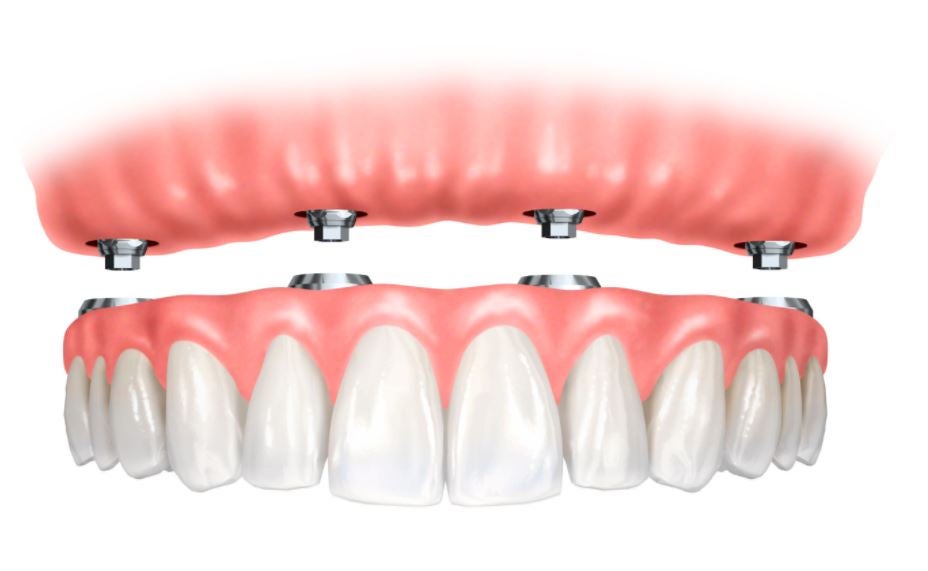
Full-arch fixed implant bridges, or sometimes called all-on-four, can be a cost-effective solution to missing teeth as they require fewer implants in the jaw than traditional methods. They can also be a great alternative to conventional removable dentures. The all-on-four dental implant procedure provides a natural looking set of teeth with a non-removable implant-supported upper and/or lower retained bridge, to restore a new and complete smile.
Schedule a consultation to find out if all-on-four implants are right for you.
How long will my implants last? Heading link
Dental implants normally last a long time with good home care and routine professional check-ups in the dental office. Like natural teeth, good oral hygiene, flossing, and brushing are needed for dental implants and their supporting restorations. Regular visits to the dental provider for maintenance is essential to monitor the health of dental implants and the connected restorations.
Do dental implants require special care and maintenance? Heading link
Dental implant care and maintenance is similar to how your dentist recommends you clean your natural teeth. Depending on the type of dental implant supported prosthesis, you may require a few additional oral care compliments to best maintain your dental work. Typical care for dental implants includes regular dental cleanings and good home care that includes brushing, flossing and rinsing with mouthwash. Some complex dental implant prostheses may require the use of accessories such as a Waterpik, special dental floss or small brushes designed to clean in tight spaces.
Are there any risks to getting dental implants? Heading link
Most dental implant procedures involve little to no risk and are safe and involve a relatively comfortable process. Significant health issues such as uncontrolled diabetes, uncontrolled high blood pressure, or serious heart problems, may require consult with your physician prior to dental implant therapy. If you have had teeth extracted without any complications, you should have no problems getting dental implants. Your dental provider will review any risks associated with your specific dental implant care needs.
How do I know implants are right for me? Heading link
The best way to know if dental implants are the suitable treatment option is to consult with a dental care professional. During the consultation appointment, the dental care provider will gather a medical history, dental history, and current oral health status. It is recommended to discuss the needs and concerns with the dental care professional, such as a general dentist, or a prosthodontist as part of the treatment planning process.
Still deciding if dental implants are right for you? Heading link
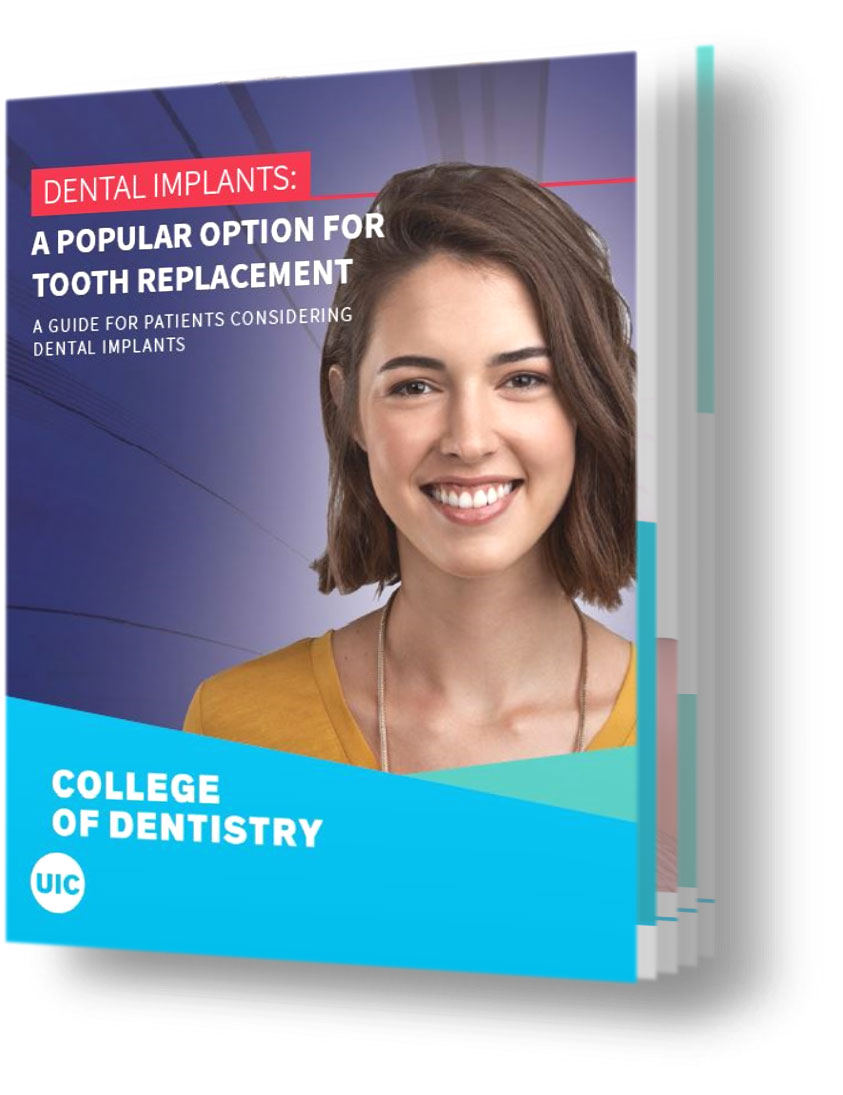
Request our complimentary e-book guide for more detail. Learn why dental implants are a popular option for replacing teeth.
Specialty Dental Care Patient Stories Heading link
Other Featured Services Heading link
Ready for an appointment? Heading link

UIC College of Dentistry provides expert, affordable crown and implant options to replace missing teeth and restore healthy smiles.
General dentists and prosthodontists at UIC provide expert and affordable dental implant restorations. During the initial visit, we can provide an estimate of costs and time to complete the treatments.
